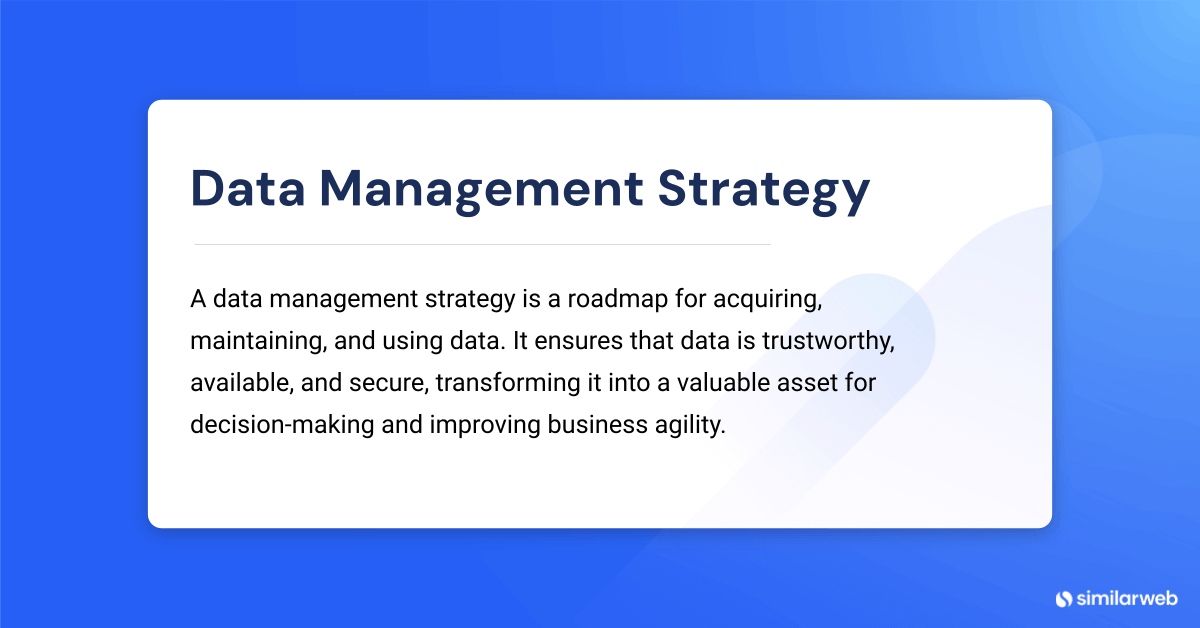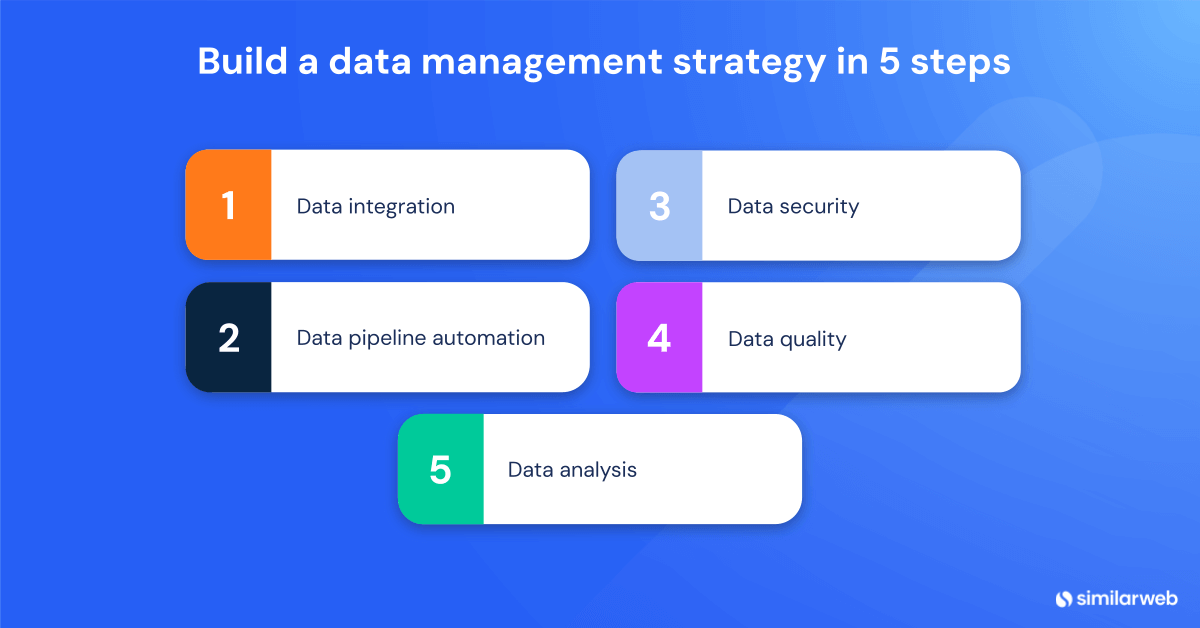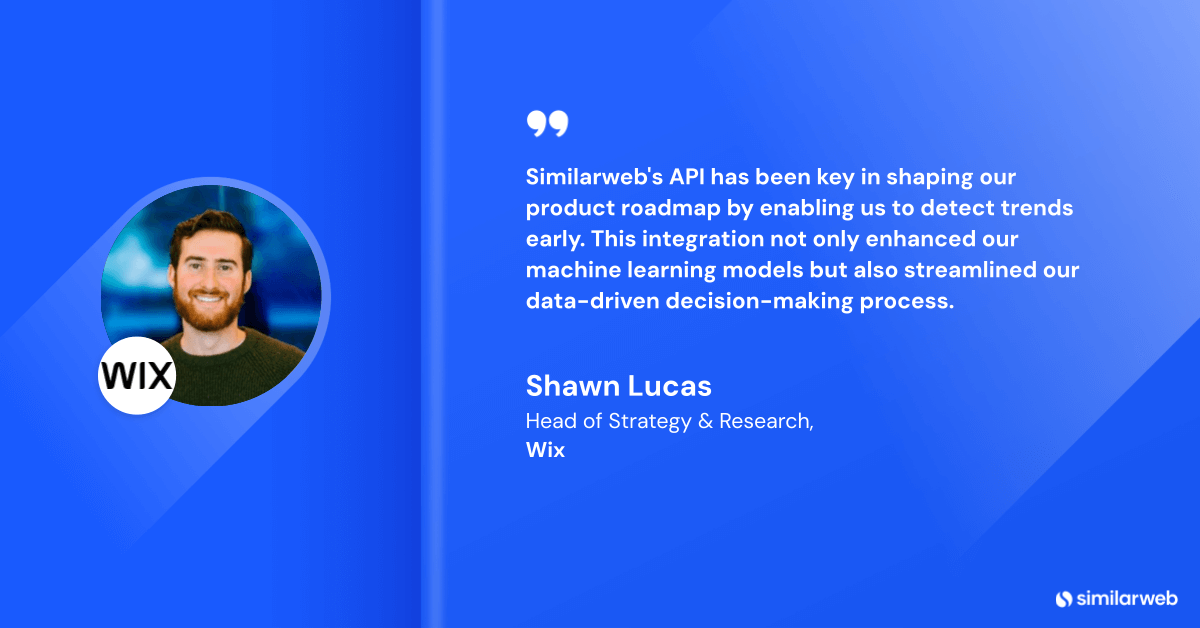How to Build an Effective Data Management Strategy

Imagine a company swimming in data but unable to extract any insights—what a waste! Without a clear data management strategy, all that information is underutilized. A well-crafted data management strategy unlocks the true value of your data, turning the data into actionable insights for business growth. Let’s explore how a great data management strategy can help you maximize the potential of your data.
What is a data management strategy?
A data management strategy is a comprehensive roadmap for acquiring, maintaining, and using data. It ensures that data is trustworthy, available, and secure, transforming it into a valuable asset for decision-making and improving business agility. The key components are:
- Data Governance: Establishes rules, policies, and accountability for managing data.
- Data Quality: Ensures accuracy, consistency, and reliability across all datasets.
- Data Architecture: Defines how data is stored, accessed, and organized to ensure efficiency.
- Data Privacy: Protects sensitive information and ensures compliance with regulatory requirements.
Essential steps for a successful data management strategy
Building an effective data management strategy involves several critical steps that help maximize the value of your data assets. Below, we break down these essential steps:
Data integration
Data integration is the process of combining information from multiple sources to create a unified view of operations. Breaking down departmental silos is key to enabling cross-functional collaboration and ensuring that decision-makers have access to comprehensive information. Integration tools unify disparate datasets, making them easier to manage, access, and analyze.
Cloud-based solutions take data integration to the next level by centralizing data storage, enabling faster retrieval and more seamless data flows across different systems. However, the main challenge lies in ensuring consistency, particularly when integrating legacy systems or third-party sources. Overcoming these challenges is crucial to building a strong foundation for effective data management.
Data pipeline automation
Manually handling data is labor-intensive and highly prone to errors. Automating your data pipelines ensures that data is collected, processed, and made available in real-time, which accelerates decision-making. Automation processes like ETL (Extract, Transform, Load) streamline data handling by converting raw data into formats ready for analysis.
Automation requires an initial investment of time and resources, but the payoff is well worth it. Cloud-based automation tools allow businesses to scale their data operations as they grow while also minimizing human errors and ensuring consistency. By automating repetitive tasks, your data teams can focus on deriving insights and adding value rather than spending time on manual data wrangling.
Data security
Data breaches can severely damage a company’s reputation and result in hefty regulatory fines. Protecting data is not just about encryption; it’s also about ensuring that only authorized personnel have access to sensitive information. Data security measures must cover data at rest (stored data) and data in transit (data being transferred).
Encryption is key, but implementing strong access controls and regularly conducting security audits are equally important. Staying compliant with regulations such as GDPR and CCPA helps ensure that customer data is protected, thereby enhancing brand credibility and building customer trust. Incorporating a security-first approach is essential for any data management strategy, especially when handling personal or confidential information.
Data quality
The quality of insights depends on the quality of data. Poor data quality leads to inaccurate analysis and poor decision-making, ultimately costing your business. Ensuring data quality involves cleaning the data—removing duplicates, correcting errors, and filling in any gaps—to ensure that it is reliable and actionable.
Establish metrics to monitor data quality regularly, such as error rates, completeness, and timeliness. Implementing data governance policies is crucial to assigning roles and responsibilities to maintain data quality across the organization. By improving the quality of your data, you enhance the reliability of your analytics and the decisions based on them.
Data analysis
Data becomes valuable when it’s analyzed to derive actionable insights. Advanced analytics tools, machine learning, and AI can be used to uncover patterns, identify trends, and make predictive analyses that guide strategic decisions. By implementing these tools, businesses not only enhance their current decision-making capabilities but also anticipate future trends and stay ahead of the competition.
Data-as-a-service (DaaS) solutions, like Similarweb, provide real-time data that enables in-depth analysis. The key is to choose the right tools that align with your business needs and to train your teams to make the most of these technologies. This way, your organization can make data-driven decisions that are both timely and effective.
Data management strategy example: Wix
Wix, one of the world’s leading website builders, needed a robust data management strategy to maintain its competitive edge. By leveraging Similarweb’s API, Wix transformed how it made decisions and built products, ensuring it remained at the forefront of the industry. Here’s how they did it:
Setting clear business objectives
Wix recognized that relying on reactive decision-making wasn’t enough to stay competitive in a rapidly changing digital landscape. By adopting a data-driven approach, Wix aimed to shift from reacting to market trends to predicting them. Leveraging Similarweb data, Wix could identify emerging trends and anticipate shifts in user behavior, allowing the company to optimize its marketing strategies, product development, and customer engagement ahead of time.
Building comprehensive data processes
Managing millions of websites meant that Wix needed a solution capable of handling vast amounts of data. Similarweb’s API provided Wix with deep insights into website traffic, keyword performance, and user behaviors across a broad range of competitors and markets. This real-time data empowered Wix to monitor performance metrics, react swiftly to changes in the market, and stay ahead of competitors by fine-tuning its offerings based on accurate, up-to-date information.
Choosing the right technology
For Wix, integrating the right tools was key to maximizing the potential of its data. Similarweb’s API became the backbone of its data infrastructure, enhancing machine learning models and enabling Wix to detect industry trends before they went mainstream. This proactive approach allowed Wix to pivot its product development roadmap, launch new features that resonated with market demands, and ensure the company was always ahead of the curve.
Implementing strong data governance
Wix knew that maintaining data integrity and privacy was essential, particularly when dealing with sensitive customer and performance data. Similarweb’s API allowed Wix to curate vast amounts of data while adhering to strict governance policies. This ensured that data was not only high quality and relevant but also used ethically and responsibly, preserving the trust of Wix’s users.
Training and execution
Wix ran training sessions for its strategy and research teams to give them the maximum utility of Similarweb’s API and brought its team members up to speed periodically on using the data for strategic decisions.
Even the best data tools require proper training. Wix invested in upskilling its strategy and research teams, ensuring they had the expertise to fully leverage the power of Similarweb’s API. Ongoing training sessions were held to align the team with the latest best practices, helping them draw meaningful insights and turn data into actionable business strategies.
Power up your data management strategy with Similarweb
As one of the most accurate data providers in the industry, Similarweb’s data is crucial to any organization’s data strategy today. Here’s how your company can harness this data to drive growth and success:
Data accuracy through Similarweb’s methodology
Good decisions are based on good data. With Similarweb, you can be sure that you are working with the right information at the right time to create reliable insights and create actionable business intelligence.
Accurate data = better decisions
The key to making informed decisions lies in the quality of your data. Similarweb’s data is collected from a variety of reliable sources, ensuring that the insights you gain are both accurate and actionable. Whether tracking industry trends, analyzing competitors, or understanding customer behavior, Similarweb provides real-time, reliable data to craft insights that help create actionable business intelligence.
Improving data access and integration
Implementing a forward-thinking data-management strategy requires reliable data access, and Similarweb’s DaaS solution brings the value of data to businesses looking to go above and beyond their existing dashboards and tools. APIs allow companies to pull or push datasets exactly when and how they need them. It’s data when you want it, how you want it. Without cutting-edge solutions to efficiently manage high volumes of data, organizations can’t remain agile.
Optimizing data management with APIs
APIs offer flexibility and scalability when it comes to data management. You can use Similarweb’s APIs to automate data extraction and analysis, significantly lowering the chances of errors. APIs allow you to incorporate data at scale directly into your business processes, feeding real-time insights into your dashboards, reports, and decision-making tools.
Start your data management transformation today
Data is powerful, but only when paired with a solid strategy. Start by identifying your business goals, building efficient data processes, and ensuring that the right tools and governance structures are in place. With Similarweb’s solutions, you can transform your data into a competitive advantage. Are you ready to take your data management strategy to the next level?
FAQs
What are the main components of a data management strategy?
The main components are data governance, data quality, data architecture, and data privacy. Together, these elements define how data is collected, managed, and used to transform it into a valuable source of business insights.
How do you evaluate the success of a data management strategy?
Success might be gauged through improvements in how people access, store, and guard data. Data quality scores, compliance rates, and the extent to which organizations use data to make decisions are the metrics that provide a window into how the strategy fares.
Can cloud services enhance data management strategies?
Yes, cloud services tend to improve data management strategies by providing scalable storage solutions, incorporating strong security systems, and providing real-time data access. Cloud strategy enables the efficient management of large datasets and smooth data integration.
What are some common challenges in data management?
Among them are data silos, inconsistent data quality, lack of governance, and the inability to comply with regulations. The challenges are well known, and an appropriate strategy is needed to overcome and address them individually.
How does data visualization support a data management strategy?
Data visualization technologies put data in these kinds of natural formats, which allows a human to see trends, patterns, unusual deviations, and other important features much more readily and to react to them more quickly. Good visualization of complex datasets is critical for making good decisions.
Sources
Maximize your growth potential
Harness the power of data with Similarweb’s APIs to drive smarter business decisions









